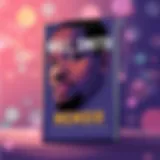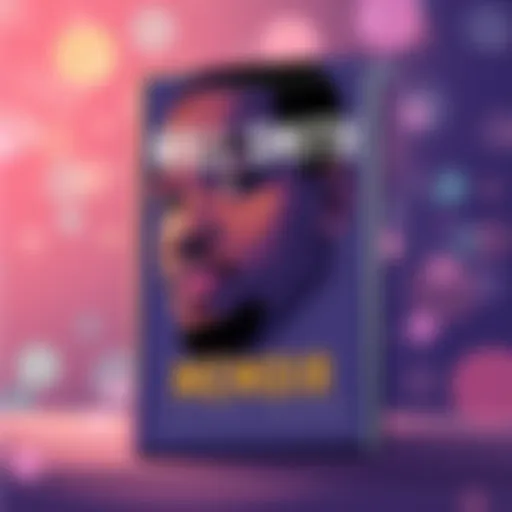Mastering the Selection of Exceptional Books to Read


Intro
Selecting a book is not merely a casual pastime; it’s a deliberate act that can shape your thinking and life. In a world flooded with endless titles and genres, honing in on that perfect read becomes an important skill. This journey begins not only with personal interests but also with an understanding of the profound themes lurking in literature. Deciding what to read can greatly influence our perspectives, ignite our imaginations, and even push us toward self-improvement.
In this guide, we’ll navigate the nuanced terrain of book selection. We’ll look closely at the categories of life-changing literature and delve into key takeaways from popular titles that can enrich everyday living. Prepare to embrace intentional reading, for the stories we choose to engage with can alter the fabric of our lives, one page at a time.
Categories of Life-Changing Books
Self-Help and Personal Development
Books in the self-help genre often promise transformations and personal growth. They dive into various aspects of our lives—emotional wellbeing, productivity, financial literacy, you name it. However, not every self-help book can deliver results. To find the gems, consider these features:
- Authenticity of the Author: Look for authors who have lived through the struggles they write about. They often provide richer insights based on real experience.
- Practical Exercises: The best self-help books usually include exercises that readers can actively engage with. This could range from journaling prompts to actionable daily tasks.
- Relatable Narratives: Books that tell a relatable story help readers connect emotionally, making the advice feel more approachable.
Spending time with books like "Atomic Habits" by James Clear or "The Power of Now" by Eckhart Tolle can provide meaningful insights into routine building and mindfulness. These books share transformative ideas that can genuinely alter your daily life.
Fiction with Transformative Themes
Fiction can also provoke change, often presenting complex characters and situations that mirror our own experiences. Here are elements to consider in transformative fiction:
- Complex Characters: Engaging with flawed characters challenges our perceptions and often leads us to self-reflection.
- Universal Themes: Look for stories that tackle big themes like love, loss, and redemption. These themes resonate across cultures.
- Narrative Style: The way a story is told—be it through a stream of consciousness or a traditional tale—can significantly influence its impact.
Novels like "To Kill a Mockingbird" by Harper Lee and "The Alchemist" by Paulo Coelho illustrate profound human truths and empathy, encouraging readers to think deeply about their own lives.
Book Summaries and Insights
Key Takeaways from Popular Titles
Understanding the essential teachings of key books can guide your own journey. For instance:
- "Mindset" by Carol S. Dweck: Dweck elaborates on the power of a growth mindset—how our beliefs about our abilities can affect our success. It’s an eye-opener in both personal and professional realms.
- "Educated" by Tara Westover: This memoir exemplifies the impact of education on personal freedom and identity, challenging the notion of belonging.
How to Apply Insights in Daily Life
Once you glean insights, the next step is application:
- Journaling: Write down key takeaways and how they resonate with your experiences.
- Discussions: Talk about the themes with friends. Engaging with others helps solidify new ideas.
- Action Steps: List practical actions you can take to integrate the insights into your life.
For intricate strikes of wisdom and transformative thoughts, consider looking into more insigthful resources at Wikipedia or Britannica.
Choosing the right book is hardly a whimsical endeavor. It requires thoughtfulness, attention to detail, and an inclination towards growth. Embrace this journey, arming yourself with the right tools for a more fulfilling reading experience.
Understanding Personal Interests
Selecting a book can sometimes feel like trying to find a needle in a haystack. In a sea of genres, authors, and topics, understanding your personal interests becomes a vital compass. This section explores why knowing what resonates with you enhances your reading experience, transforms casual readers into passionate dwellers of worlds unknown, and plays a key role in making literary choices.
Identifying Your Reading Preferences
The journey begins with a good hard look at what you actually enjoy. Are you drawn to the sharp words of a mystery novel? Do you find solace in poetic prose that paints vivid pictures? Identifying your reading preferences helps narrow the vast selection. Think of it as creating a personalized menu before heading to a buffet: when you know what you like, the choices become less overwhelming and far more tempting.
- Self-Reflection: Spend a little time reflecting on books you've read in the past. What themes or styles stood out to you? Those clues are breadcrumbs leading towards your preferred genres.
- Journaling: Maintaining a reading journal can be beneficial. Take a moment to jot down your thoughts on what you liked and what didn’t quite hit the mark.
- Consult Friends: Sometimes, having a chat with a friend about books can uncover preferences you never knew you had. They might introduce you to a genre that seems off the wall but actually aligns with your taste.
Exploring Different Genres
Once you've got an understanding of your preferences, it's time to spread your wings and explore. The literary world is filled with various genres, and many times, you might find a gem tucked in an unexpected place.
Genres can range from fiction to non-fiction, fantasy to biography. Don't shy away from genres that pique your curiosity but might be outside your usual comfort zone. Each genre has its unique flavor:
- Fantasy: Offers a great escape from reality with magical realms and mythical creatures.
- Science Fiction: Engages with the future, technology, and existential questions that tickle the mind.
- Historical Fiction: Provides a window into the past while telling engaging stories.
- Non-Fiction: Works wonders for those looking to learn; encompasses memoirs, self-help, and current affairs.
It’s helpful to treat genre exploration like tasting new foods; you might discover your next favorite "dish" in a genre you thought you wouldn’t enjoy.
Assessing What Captivates You
What lingers after the last page is turned? Reflecting on what truly captivates you during a read can yield invaluable insights into your literary preferences. Take mental notes of moments that made you laugh out loud, cry, or simply pause in thought. These emotional reactions often highlight the elements that resonate most.
- Themes: Perhaps you are drawn to stories of resilience or tales of romantic struggle. Themes can guide you toward books that will engage your heart and mind.
- Character Connection: The connection you establish with characters, their journeys, and trials can leave a mark that influences your future reading choices.
- Writing Style: Sometimes it’s the author’s voice—lyrical, punchy, or understated—that pulls you in. Evaluate if you connect more with detailed descriptions or succinct narratives.


"Every book is a journey, a voyage into the unknown—and knowing what stirs your imagination is the key to unlocking countless adventurous paths."
Understanding your personal interests sets a solid foundation for choosing books that not only entertain but also enrich your experience as a reader. With this clarity, the quest to find the perfect book transforms from a daunting task into a thrilling adventure of discovery.
Criteria for a Great Book
Selecting literature that captivates and resonates often hinges on specific criteria. Understanding these factors can elevate one's reading experience. The right book enriches the mind and stirs emotions. Therefore, knowing the elements to consider enables readers to sift through countless options in today’s literary marketplace.
Depth of Themes
When one thinks of the core of a narrative, themes play the starring role. A book with profound themes often lingers in the mind long after the last page is turned. Themes explore life’s complexities, such as love, loss, identity, and the essence of humanity. They ask tough questions and evoke emotions, making readers reflect on personal experiences. For instance, consider "The Dispossessed" by Ursula K. Le Guin, which dives deep into the intricacies of utopia and anarchist philosophies, forcing readers to grapple with their own beliefs about society.
Readers benefit from rich themes as they gain insights, promoting personal growth. A book’s theme can connect with readers on a deeper level, almost like a mirror, reflecting their struggles or triumphs. Hence, before settling on a book, ask:
- What themes resonate with your own life?
- Are you looking for escapism or introspection?
- How might exploring certain themes impact your understanding of the world?
Character Development
Parallel to the exploration of themes is the intricate art of character development. Well-crafted characters are not simply vessels for a story; they breathe life into the narrative. A well-written character often evolves, offering depth and relatability. Consider Elizabeth Bennet from Pride and Prejudice. Her journey from initial prejudice to understanding showcases development that mirrors real-life growth. Readers may find solace or inspiration in characters facing challenges similar to their own.
Characters are also essential for emotional connection. Readers may find themselves rooting for characters to succeed or empathizing when they face obstacles. The more relatable a character, the more likely the reader feels invested in their journey. To assess character development in a book:
- Does the character grow throughout the story?
- Are the character's motivations clear and relatable?
- Do their struggles resonate on a personal level?
Narrative Voice and Style
The narrative voice and writing style contribute to the book's overall flavor. An engaging voice can transport readers into another world, while a unique style can turn a simple story into a mesmerizing tale. For example, James Joyce's Ulysses utilizes a stream-of-consciousness style that offers a fresh perspective on everyday life.
A reader’s experience can be dramatically altered by the narrative voice, whether it’s first-person confessions or third-person omniscience. Different styles cater to different tastes. Some may appreciate a spare and concise approach similar to Ernest Hemingway, while others might gravitate towards lush, descriptive prose like that of Gabriel Garcia Márquez.
Before selecting a book, consider:
- Does the narrative voice align with your preferences?
- Is the writing style captivating or tedious for you?
- Are you in the mood for a straightforward, accessible read or something more complex and layered?
Understanding the depth of themes, character development, and narrative voice equips readers with better tools to pick books that resonate with them personally. Engaging with literature in this careful way opens the door to deeper understanding and enjoyment.
The Role of Context
Understanding the context in which a book is written and the circumstances of its readers is vital. It shapes our interpretation of themes, characters, and narratives. The value of a book can shift dramatically based on historical, cultural, and personal lenses. Considering these contexts not only enhances the reading experience but also fosters a deeper connection with the material. This section dives into the interplay between a book and its context, elaborating on how these facets influence the reading journey.
Historical Background
When examining a text, it's essential to place it within its historical framework. This involves not only the time period in which the author wrote but also the prevailing societal conditions, political climates, and significant events of that era.
For instance, reading George Orwell’s 1984 today involves understanding the Cold War fears that influenced its creation. Orwell's portrayal of a dystopian future heavily critiques totalitarian regimes, echoing the anxieties of his time. If one were to read this book without that historical lens, it might come across merely as a fictional tale rather than a powerful commentary on governance and freedom. Recognizing such backgrounds can profoundly affect how we interpret key messages in literature.
Moreover, different eras have varying standards and norms, affecting language, character portrayal, and themes. Pay attention not just to what happens in the story, but why it matters during that period.
Cultural Influences
Culture plays an equally significant role in shaping literary works. The cultural background of an author informs their storytelling approach, the behavior of characters, and the themes they choose to explore.
Consider Chinua Achebe’s Things Fall Apart. This novel provides a rich depiction of Igbo culture and the impact of colonialism on traditional African societies. It’s not just a narrative about one man; it’s a portrayal of an entire way of life, splintered by external forces. Readers from different backgrounds might interpret Achebe’s description of customs and practices through various cultural lenses, which can either open up new understandings or create misinterpretations.
Being aware of cultural influences allows readers to appreciate the nuances in storytelling. The subtleties of humor, pain, joy, and conflict often differ across cultures, and grasping these aspects enriches our reading experience immensely.
Personal Circumstances
Lastly, an individual’s personal circumstances deeply affect how one engages with a book. Factors such as age, life experiences, emotional maturity, and current situations impact comprehension and resonance.
Reading J.D. Salinger’s The Catcher in the Rye might strike different chords at different stages of life. A teenager may relate strongly to Holden Caulfield’s angst, while a middle-aged reader might see the character's struggles as a reflection on lost opportunities and the inevitable march of adulthood. Such reflections can lead to varied insights, making a book feel uniquely personal to each reader.
Building a Reading List
Building a reading list is like assembling a toolkit for intellectual exploration. It allows you to focus your reading endeavors, ensuring that each book you dive into serves a purpose and enriches your understanding. A well-crafted list not only keeps you organized but also reflects your evolving interests and aspirations.
By systematically compiling your choices, you not only prioritize your time but also cultivate a habit of thoughtful reading. The importance of a reading list lies in its ability to guide your literary journey while encouraging a sense of intention and mindfulness in your selections.


Sources for Recommendations
Finding reliable sources for book recommendations is crucial in crafting an impactful reading list. Consider the following:
- Literary Blogs and Websites: Platforms like Goodreads, Book Riot, and the New York Times Book Review provide curated lists and discussions on current literary trends and noteworthy releases.
- Social Media: Engaging with book-related hashtags on Twitter or Instagram, or following pages dedicated to book reviews on Facebook can spark interest in various titles.
- Personal Networks: Never underestimate the power of word-of-mouth. Conversations with friends, family, or colleagues about their recent reads can yield hidden gems you might not have discovered otherwise.
- Podcasts and BookTubers: There’s a wealth of content creators specializing in books. Their discussions often highlight themes or titles that resonate, which may otherwise slip under the radar.
These sources can serve as springboards, propelling your reading list forward, but don't just grab the most popular titles. Take a moment to assess which recommendations align with your tastes.
Creating a Balanced List
In the realm of literature, balance is key. It’s easy to fall into a rut with similar genres or themes, but diversity in your reading list can make all the difference in keeping your exploration lively and enriching.
When assembling a balanced list, consider:
- Mixing Genres: Aim for a combination of fiction and non-fiction to provide both escape and insight. Incorporating different styles helps broaden your perspective.
- Diverse Authors: Reading works from authors of varied backgrounds and perspectives can deepen your understanding of different cultures and experiences.
- Different Lengths and Formats: Include novels, essays, poetry, and even graphic novels. Mixing formats not only prevents monotony but also keeps the experience fresh.
"The beauty of reading lies not just in the story itself, but in the variety of stories waiting to be told."
Mixing Fiction with Non-Fiction
In today's busy world, finding time to read can be a challenge, and this is where mixing fiction with non-fiction becomes a valuable strategy. Each category has its own merits, and when combined, they can foster a well-rounded mindset.
- Fiction helps you explore the depths of human emotion and imagination, providing stories that can evoke empathy and understanding of complex characters.
- Non-Fiction, on the other hand, equips you with knowledge, facts, and the real-world context that informs your interpretation of those emotions and stories.
For example, reading a novel set in a historical context followed by a non-fiction book on the same topic creates a multidimensional understanding of the events and character motivations. Doing so gives you not only the narrative experience but also the analytical framework necessary for deeper comprehension.
Engaging with the Text
Engaging with a text is more than just skimming through pages; it’s about diving deep and wrestling with what you read. This section sheds light on how actively engaging can foster a richer understanding and appreciation of literature. It does this by emphasizing the importance of connection—between the reader and the book, as well as the narrative’s themes, characters, and context. This engagement transforms reading from a passive activity into an enlightening conversation with the text itself.
Annotating and Note-Taking
Annotating or note-taking can be the lifeblood of a great reading experience. It allows the reader to record thoughts, questions, and connections as they unfold. This practice not only helps in retaining information but also in developing personal insights. There’s something about writing in the margins, underlining passages that resonate, or jotting down a fleeting thought that captures the experience at a deeper level. Here are a few strategies to enhance your annotation techniques:
- Highlight Key Passages: Use a colored marker to draw attention to sentences that strike a chord and might bounce back into your thoughts later.
- Margin Notes: Write comments, agree or disagree, pose questions. A simple question like, “Why did the character choose this?” can lead to great insight later.
- Use Symbols: Develop a system of symbols (e.g., a star for brilliant points, an exclamation mark for shocking revelations) that can make looking back at your notes more efficient.
Through this process, not only do you cement your understanding, but you also craft a personal roadmap through the author’s ideas.
Participating in Discussions
Engaging with a text can greatly benefit from communal interactions. Participating in discussions can widen your perspective and provide alternative viewpoints. Joining book clubs or online forums, like those on reddit.com, can facilitate these conversations. Whether face-to-face or online, sharing your thoughts with others can often spark deeper understanding. You might even encounter individuals who challenge your views, leading to a richer insight. Consider the following:
- Book Clubs: These provide a structured format for discussion, where everyone shares what they’ve gleaned from the same text. Each voice adds layers to understanding.
- Online Platforms: Websites dedicated to literary dialogue, for instance, goodreads.com, offer forum spaces to discuss everything from character dynamics to thematic elements.
- Social Media: Engaging on platforms such as facebook.com can also lead to insightful exchanges about books, providing visibility into how others perceive the same themes.
In discussions, it’s important to listen just as much as you contribute. You never know when a fresh idea might illuminate something you skipped over.
Reflecting on Key Takeaways
The final piece of engaging with a text lies in reflection. After fully interacting with a book—through annotation and discussion—take time to muse over your key takeaways. This process doesn’t just wrap up your reading experience; it integrates the lessons learned into your life. Reflect on these questions:
- What resonated with you? Identify specific passages or themes that struck a chord.
- How did the book influence your thinking? Consider its impact on your perspective or behavior.
- What are your next steps? Think about how this book steers your future reading choices or personal growth.
Taking these moments to pause and reflect can turn mere reading into a significant learning experience. Each book can potentially alter the way you see the world, prompting introspection and motivating future explorations.
Evaluating Your Experience
Evaluating your experience with a book goes beyond simply reading the pages. It’s about what you take away from the journey—a sort of post-mortem on the intellectual and emotional engagement you had while flipping through the chapters. This process is crucial as it allows you to critically assess how the text resonated with your thoughts and feelings, and also what lasting impressions it left behind. The benefits of this practice are clear: an enhanced ability to identify what truly captivates you, leading to better reading choices in the future.
Personal Growth and Insights
As you delve into a new book, consider how it shapes your personal growth. Each story or concept has the potential to challenge your perspective or affirm your existing values. For instance, a reader might pick up a psychological thriller and find themselves reflecting on moral dilemmas, or a historical narrative might spark an interest in learning more about a specific era. The insights gained can be profound. You might discover new passions or rethink life choices based on themes you encountered.
Regular reflection on the ideas presented in books can lead to deeper understanding and a more nuanced worldview. Try asking yourself:
- What themes struck me the most?
- Did any character remind me of someone I know?
- How did this book relate to my life experiences?
Understanding Impact and Influence


Books can have a significant impact—some can shift your entire outlook. Think about it; how often has a particular line from a novel or a poignant moment in a memoir stayed with you long after you’ve closed the cover? Analyzing these impacts is essential. It helps you understand not just your emotional reactions but also how particular narratives or arguments influenced your thoughts.
Being mindful of books that carry weight in your life can guide your future selections.
- What topics have changed your opinion unknowingly?
- Has a book made you more empathetic toward a group or idea?
The influence of literature can sometimes be subtle, occupying a space in your subconscious and guiding both thought and behavior in everyday life.
Seeking Follow-Up Reads
Once you've evaluated your literary experience, you might feel an urge to dive deeper into the themes that sparked your interest or resonated with your personal life. The hunt for follow-up reads becomes important here. Following up does not simply mean choosing any book from the same genre; it’s about digging into the layers of what you've just read.
Consider seeking out authors who explore similar ideas, or perhaps diving into more rigorous non-fiction that investigates the themes presented in the fiction you read. This could be a stepping stone in expanding your understanding of a subject. You might also consider:
- Checking author interviews or lectures for deeper insights.
- Exploring literary critiques or essays related to your recent reads.
- Engaging in online discussions that expand perspectives on your favorite books.
By making these connections, you ensure that your reading journey is not static but progressively enriching, expanding the narrative of your literacy experience.
Utilizing Online Resources
In today’s digital age, the ability to tap into online resources can greatly enhance your book selection process. The internet is a treasure trove filled with opportunities to discover new literature, engage with fellow readers, and deepen your understanding of a text before diving into it. By utilizing these resources, you not only save time in finding your next read but also expand your horizons beyond typical bookstore shelves.
Accessing Free Literature
Fulfilling your reading desires without straining your budget is possible thanks to a plethora of free literature available online. Various platforms offer access to ebooks, audiobooks, and even classical literature that often exists in the public domain.
Some useful websites include:
- Project Gutenberg: Hosts over 60,000 free ebooks. Great for classics that shaped literary history.
- Open Library: A unique initiative aiming to create a web page for every book ever published. They offer options to borrow or read books.
- LibriVox: Provides free audiobooks of public domain texts read by volunteers from around the world.
In addition to these, many public libraries now offer digital lending services, so you can borrow ebooks directly to your device. When you think about it, accessing free literature isn't just about savings; it’s also a way to explore diverse genres and authors without commitment.
Online Book Clubs and Forums
Engaging with communities can be a game-changer in your reading journey. Online book clubs and forums provide a sense of camaraderie, making reading a shared experience rather than a solitary activity. You can find discussions that span genres, from fantasy to autobiographies.
Here are a few popular platforms:
- Goodreads: Not only can you track your reading, but you can also join groups and attend discussions.
- Reddit: Subreddits like r/books or r/bookclub serve as vibrant platforms where people's opinions on recent reads or timeless classics are vibrant and diverse.
- Facebook: Many groups are dedicated to specific genres or authors, providing space for recommendations and discussions.
Participating in these groups helps you peek into what ignites others’ passions and why. You might stumble across an author or a book that you would have otherwise overlooked.
Exploring Summaries and Reviews
Before making a purchase or committing time to read a book, exploring summaries and reviews can save you from potential disappointments. Websites with robust summation features allow readers to gauge whether a book’s content aligns with what they are looking for.
Helpful resources include:
- Amazon: Check customer reviews for a plethora of insights, though take the spectrum of opinions into consideration.
- BookRiot: Offers insights and reviews focused on diverse topics, ensuring you receive well-rounded perspectives.
- YouTube: Many booktubers provide analysis and reviews, often mixing humor and depth in their storytelling.
When you read summaries and reviews, focus on identifying common themes. Let others’ experiences guide your decision-making process, refining your book selection with a more informed outlook.
"Reading brings us unknown friends." – Honoré de Balzac
Epilogue and Final Thoughts
In exploring how to select a truly great book, we've delved into various aspects that illuminate the reading experience. The key takeaway here is that finding the right book isn't merely about picking up the latest bestseller; it involves a nuanced understanding of personal interests, thematic depth, and the context surrounding literature.
Encouragement to Read Intentionally
Reading should be approached with purpose. This could mean setting out to explore diverse genres or plunging into heavy themes that resonate with your current life stage. When you choose to read intentionally, you're selecting books that not only entertain but also enrich your mind, spurring you to analyze, reflect, and understand various perspectives. It’s like walking into a gallery where each book is a painting, waiting to invoke different emotions and thoughts within you.
Consider the following when you aim for intentional reading:
- Identify goals for your reading journey; whether you want to educate yourself, find solace, or challenge your beliefs.
- Dare to explore genres that lie outside of your comfort zone. A mystery novel might intrigue you, or a philosophical treatise could shake the foundations of your understanding.
- Reflect back on your choices. Ask yourself what you seek from the story: an escape, an enlightenment, or something else entirely?
The Lifelong Journey of Reading
Reading is not a race; it’s a slow, winding path filled with unexpected detours. Each book acts as a stepping stone in a vast landscape of knowledge and understanding. Embrace reading as a lifelong commitment, where every finished page encourages you to seek another story to unfold. This journey offers endless opportunities for personal growth, discovery, and fulfillment. Each book can be a friend during lonely nights, a guide in moments of confusion, or a source of inspiration in times of stagnation.
As you march along this path, consider the benefits of establishing a rhythmic reading habit:
- Consistency will help you evolve as a reader. Just fifteen minutes a day can create significant change over time.
- Engagement with other readers through book clubs or platforms like Reddit or Facebook can enhance your experience, exposing you to varying viewpoints.
- Reflection as a habit solidifies memories of what you’ve read, making it more probable that the insights will linger long after closing the book’s cover.
The journey of reading, rich in its probability, not only broadens your future comprehension but also shapes who you are—one page and one book at a time.















